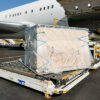How to Ship Freight Internationally
Whether you’re moving to a new country and need to ship all your belongings or looking to ship inventory worldwide, the process can be complicated and confusing. Unlike shipping nationally, international shipping has many more rules and regulations that must be followed or risk massive delays in shipment times and increased fees. Here are some of the basics to keep in mind when shipping internationally.
Mode of Transportation
Depending on the quantity and size of your shipment, you will need to determine if you will be shipping via air, ocean, or land. Air is the fasted yet most expensive option and is suitable for freight that might be sensitive to the heat, cold, or humidity that other modes of transportation might expose it to. The most cost-effective yet slowest form of international transport is via ocean container shipping. Goods are packaged in either full or shared shipping containers and placed on a ship where they sail to a port and pass through customs. After payment of duties and taxes, the shipment will be released for delivery.
Required Documents
Several vital documents must accompany an international shipment. If any required documents are missing, your shipment will be delayed, which usually means you’ll incur additional fees. Which documents you need might vary by country, but here are the most common ones you should be aware of:
Commercial Invoice-a customs document that serves as a request for payment. Includes details such as country of origin and harmonized system code needed for crossing the border.
Certificate of Origin-document that states which country the products you are shipping originated from
Shipper’s Export Declaration-contains details of the goods being exported or imported and provides information on the type, quantity, and value of the goods
NAFTA Certificate of Origin-used by the United States, Canada, and Mexico and determines if the goods imported into those countries receive reduced or eliminated duties
Bill of Lading-details the type, quantity, and destination of the goods being shipped
Regulations
Each country has its regulations, requirements, and restrictions for imported goods. Government regulations can limit the quantity or size of items being imported or exported as well as the type of goods. Every country has a list of prohibited and controlled items subject to specific requirements to guarantee safe delivery. You must also meet all the necessary import and export customs clearance for your shipment.
Freight Forwarders
Navigating the international shipment process can be daunting, but help is available. International freight forwarders coordinate all the details between the sellers and the buyers. They manage all the documentation, regulations, and scheduling from start to finish. Alaska Air Forwarding works with our extended network to ship your goods worldwide. Whether business or personal, we'll provide you with worry-free international shipping solutions. Browse our site to learn more about your international shipping options.






